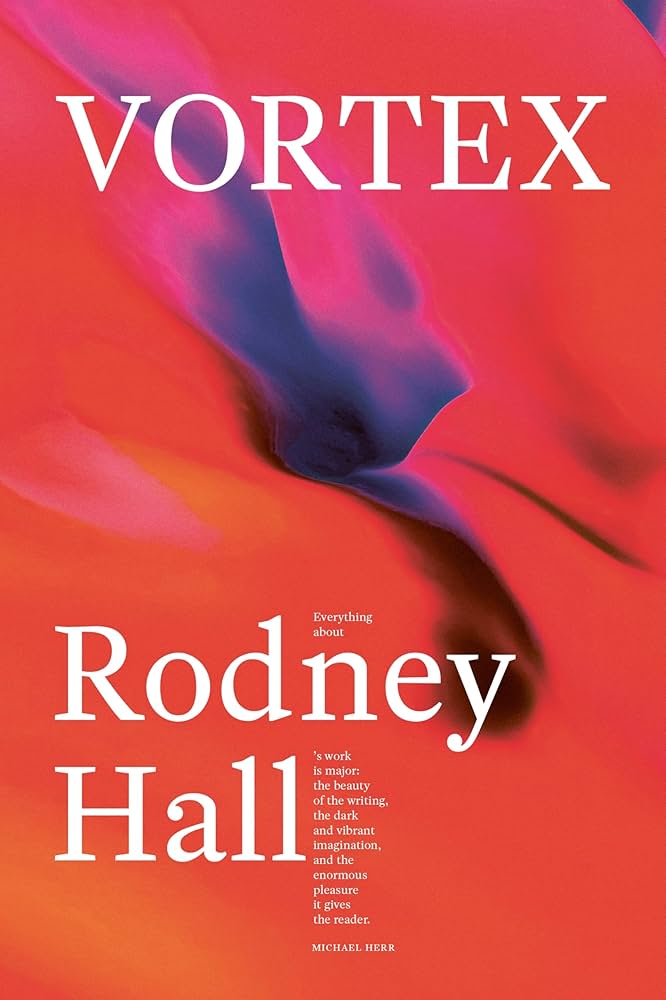
- Free Article: No
- Contents Category: Fiction
- Review Article: Yes
- Article Title: A web of music
- Article Subtitle: A substantial addition to Rodney Hall’s oeuvre
- Online Only: No
- Custom Highlight Text:
The title of Rodney Hall’s thirteenth novel, Vortex, means to convey something of its considerable formal and thematic ambitions. The implicit promise is that its various elements, however fragmented or disparate they may seem, will converge with the swirling inexorability of a whirlpool or a black hole. As a dynamic metaphor for the novel’s wide-ranging vision of history, the title might be interpreted as the opposite of a widening gyre, a repudiation of the terrifying prospect of mere anarchy, an affirmation of the idea that there is a shape (and indeed a gravity) to events that grants them a kind of coherence, though the fact that the ordering centre of a vortex is also the point of annihilation is hardly reassuring.
- Featured Image (400px * 250px):

- Alt Tag (Featured Image): James Ley review ‘Vortex’ by Rodney Hall
- Book 1 Title: Vortex
- Book 1 Biblio: Picador, $34.99 pb, 453 pp
- Book 1 Cover Small (400 x 600):

- Book 1 Cover (800 x 1200):

- Book 1 Readings Link: https://www.readings.com.au/product/9781761560767/vortex--rodney-hall--2024--9781761560767#rac:jokjjzr6ly9m
There is a visual affinity between these two defining metaphors in the spiral pattern of a spider’s web, and a conceptual affinity in the repudiation of linearity and a shared sense of fatalism – neither is something one would want to be caught in. But it is the suggestive incongruence, the contrast between the respective means of entrapment, that opens up the imaginative space of the novel. The irresistible centripetal force of a vortex is a very different proposition to the static concept of a web. One draws you in; the other immobilises you, fixes you at the intersection of multiple determining threads. Vortex squares this circle by surveying its historical moment from the sclerotic point of a turning world, a marginal setting it conceptualises as central: a place where the violent and chaotic forces of history can be seen to converge, but which is itself inert, a place where nothing much happens – a cultural and historical black hole, so to speak. And where would one find such a place? Hall’s precise solution to this conceptual conundrum, viewed in a certain light, is actually quite funny: Brisbane in 1954.
 Queen Elizabeth II and Prince Phillip in Brisbane, 1954 (Alpha Historica / Alamy)
Queen Elizabeth II and Prince Phillip in Brisbane, 1954 (Alpha Historica / Alamy)
At its most expansive, Vortex is global in outlook. It depicts a world in transition, still reeling from the carnage of World War II, but beginning to coalesce into a new order. The fragmented narrative reaches beyond its Australian setting to evoke the waning of the British Empire and the escalation of the Cold War. There are references to the first stirrings of the conflict that would mutate into the Vietnam War and to massacres of communists in Indonesia and Kenya. The novel also alludes to the beginnings of the space race and the communications revolution enabled by satellite technology. There is even some foreshadowing – somewhat oblique, but clear enough (one instance involves a prophetic dream) – of the fortress mentality that has come to characterise the populist nationalism of this century, thanks in no small part to the pioneering viciousness of Australia’s border policies.
Against this sweeping historical backdrop, Hall parades a sharply drawn cast of cosmopolitan characters who have found themselves in the international backwater of Brisbane as the city prepares for the arrival of the young Queen Elizabeth II on her first royal tour of the antipodes. When they are not themselves satirical targets, these characters bring to the novel a droll, defamiliarising gaze, their very presence an ironic undermining of Australia’s presumed distance from world affairs. The intellectual Dr Bródy, a refugee from the European war, supplies the most articulate and amusing denunciations of the cultural backwardness and philistinism of a country that refuses even to recognise his numerous academic qualifications. Vassily Hmelinsky, a loyal tsarist who fled the Russian Revolution and now lives as a vagrant on the streets of Brisbane, gives the novel an angle on Australia’s pre-eminent Cold War scandal, the Petrov Affair. A disaffected Spanish countess named Paloma is there because her pompous husband Colonel Claverhouse – a man full of ‘tinpot self-importance’ – is in charge of security for the royal tour.
But the heart of Vortex, and its narrative spine (it is the closest the novel comes to the dread word ‘story’), is Hall’s sensitive depiction of a relationship that develops between an adolescent boy named Compton Gillespie and a German immigrant named Beckmann. The pair meet at a museum in front of a display of Tollund Man, an ancient corpse discovered in a Danish bog with a rope around his neck. Their casual speculations about his death (was he murdered? was he a willing participant in some kind of ritual sacrifice?) turn Compton’s thoughts to the vortex of history, its many lost and unknowable details, what it might reveal about the mysteries of human behaviour. They also rouse his curiosity about Beckmann, who becomes a somewhat enigmatic father-figure for the solitary fatherless boy, whose mother is in hospital stricken with cancer, and who is uncertain about how to mature into manhood.
Compton is intrigued that Beckmann fought for the enemy in the last war. Even more intriguingly, Beckmann claims that Wolfgang Borchert’s The Man Outside, a celebrated German play about a suicidal soldier recently returned from the battle of Stalingrad, was written about him. Other details about his past are revealed, though pointedly it never quite comes into focus. Beckmann does, however, present Compton with two symbolic gifts: a book (a translation of Borchert’s writing) and a wristwatch. In this sense, Vortex is less a novel of revelation than a story of initiation. Beckmann is an elusive figure who emerges simultaneously from history and literature, awakening Compton to the significance of both. In a deeper sense, he suggests a curious symbiosis between the two, the entanglement and necessity of their insights, his example ultimately leading Compton to seek truths closer to home, in defiance of the denials and evasions of Australia’s violent colonial history.
In a reflective passage that seems for a moment to break free of the novel’s scrupulously observant quality, Hall acknowledges the ‘fragmentation. In this case the chosen year – an arbitrary slice of time – can only be imagined thanks to that friction between what we remember as happening and what actually happened. The interruptibility of a web of music. Such is the tragedy of the book you have in your hand.’ He goes on to quote Kafka’s frequently cited line about literature’s imperative to hack at the frozen sea inside us with an axe, musing in a somewhat apologetic tone that the passing of time and the vagaries of memory have rendered his capacity to do so ‘unavoidably diminished’.
Vortex is nevertheless a substantial addition to Hall’s already substantial body of work. It is a novel that draws its full measure of vitality from its concerted attempt to recreate a particular time and place. Capacious and richly descriptive, it at times earns the labels loose and baggy; it sets out to cover an extraordinary amount of historical ground. But it is just as often content to luxuriate in its Joycean sprawl, taking pleasure in the sound and shape of its inventive sentences. The fragmented technique is, on occasion, reminiscent of the ‘Wandering Rocks’ episode in Ulysses. The novel’s unconstrained perspective ranges across the city and beyond to convey the multifariousness and simultaneity of life. Sections begin and end mid-sentence, allowing them to flow into each other, but also suggesting that we are always arriving in medias res and the events we witness will continue to unfold when out attention is redirected. At its best, the novel’s imaginative reach, and the ease and freedom of Hall’s late style, affirm the literary principle that, for a capable writer, the centre of the world can be anywhere.


Comments powered by CComment